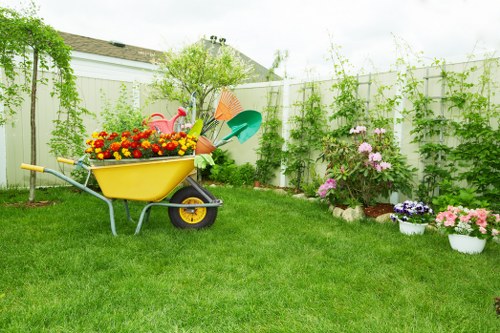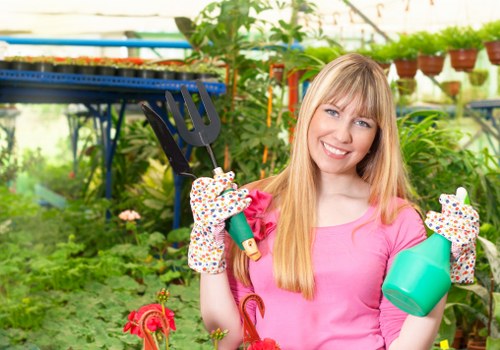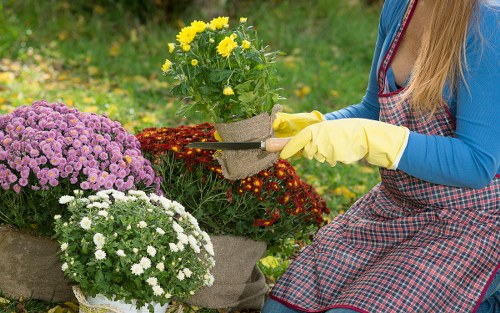Comprehensive Guide to Garden Maintenance in Deptford

Introduction to Garden Maintenance
Maintaining a beautiful garden in Deptford requires a combination of knowledge, dedication, and the right techniques. Whether you are a seasoned gardener or a beginner, understanding the specific needs of your garden can make all the difference.
Garden maintenance encompasses a variety of tasks, from regular watering and pruning to soil enrichment and pest control. Each season brings its unique set of challenges and opportunities for enhancing your garden's beauty and health.
Deptford's climate and soil conditions play a significant role in determining the best practices for garden maintenance. By tailoring your approach to suit the local environment, you can ensure that your garden thrives year-round.

Seasonal Garden Care
Spring Maintenance
Spring is a critical time for garden maintenance in Deptford. As the weather warms up, it's essential to prepare your garden for the growing season ahead.
Key Spring Tasks:
- Pruning dead or damaged branches to promote healthy growth.
- Preparing soil by adding compost or fertilizers to enrich it.
- Planting new flowers, vegetables, and shrubs suited to the local climate.
Regular weeding and pest inspections during spring can prevent issues from escalating, ensuring that your plants have the best start possible.

Summer Maintenance
Summer brings warmer temperatures and longer days, creating ideal conditions for garden expansion and vibrant growth.
Essential Summer Practices:
- Consistent watering schedules to keep plants hydrated.
- Mulching to retain soil moisture and suppress weeds.
- Regular harvesting of vegetables and flowers to encourage continuous production.
Protecting your garden from pests and diseases becomes even more critical during the summer months. Implementing natural pest control methods can help maintain a healthy garden ecosystem.

Soil Health and Fertilization
Understanding Soil Composition
The foundation of a thriving garden is healthy soil. In Deptford, the soil composition can vary, making it crucial to test and amend it accordingly.
Soil testing helps determine pH levels and nutrient deficiencies, allowing gardeners to make informed decisions about fertilization and soil amendments.
Incorporating organic matter, such as compost or aged manure, can improve soil structure, enhance drainage, and provide essential nutrients to plants.

Choosing the Right Fertilizers
Selecting appropriate fertilizers is vital for maintaining soil fertility and promoting plant growth. Organic fertilizers, such as bone meal and fish emulsion, are excellent choices for eco-friendly garden maintenance.
Benefits of Organic Fertilizers:
- Improve soil health by increasing microbial activity.
- Provide slow-release nutrients, reducing the risk of plant burn.
- Sustain long-term fertility compared to synthetic options.
Regularly applying fertilizers based on soil test results ensures that your plants receive the necessary nutrients for optimal growth.
Weed Control Strategies
Preventative Measures
Weeds compete with your garden plants for resources, making effective weed control essential for maintaining a healthy garden.
Preventative Measures Include:
- Mulching to block weed growth and retain soil moisture.
- Using landscape fabrics in pathways and flower beds.
- Regularly inspecting and hand-pulling weeds before they set seed.
Implementing these strategies can significantly reduce the presence of unwanted plants, allowing your garden to flourish.
Organic Weed Control
Organic methods of weed control are environmentally friendly and safe for your garden's ecosystem.
Some effective organic weed control techniques include:
- Applying vinegar-based herbicides.
- Using boiling water to kill stubborn weeds.
- Planting ground covers that suppress weed growth.
By choosing organic options, you maintain a healthy garden without relying on harmful chemicals.
Pruning and Trimming
Why Pruning is Important
Regular pruning and trimming are essential for shaping plants, removing dead or diseased branches, and promoting healthy growth.
Pruning Benefits:
- Enhances plant structure and appearance.
- Improves air circulation, reducing the risk of disease.
- Encourages the growth of new shoots and flowers.
Proper pruning techniques vary depending on the type of plant, so it's important to research specific requirements for each species in your garden.
Tools for Pruning
Using the right tools can make pruning more efficient and prevent damage to plants.
Essential pruning tools include:
- Sharp pruning shears for small branches.
- Pruning saws for larger limbs.
- Gloves to protect your hands from thorns and debris.
Regularly maintaining your pruning tools ensures clean cuts and promotes plant health.
Watering Techniques
Efficient Watering Practices
Proper watering is crucial for garden health, especially in Deptford's varying climate conditions.
Efficient watering practices help conserve water, reduce runoff, and ensure that plants receive adequate moisture.
Consider the following techniques to optimize your garden's watering:
Drip Irrigation
Drip irrigation systems deliver water directly to the plant roots, minimizing evaporation and waste.
- Install drip lines around base of plants.
- Use timers to automate watering schedules.
- Monitor system regularly for leaks and clogs.
Mulching
Mulching not only suppresses weeds but also helps retain soil moisture, reducing the need for frequent watering.
- Apply a 2-3 inch layer of organic mulch around plants.
- Replenish mulch as it decomposes.
- Ensure mulch is kept away from plant stems to prevent rot.
Watering Timing
Watering early in the morning or late in the evening reduces water loss due to evaporation and allows plants to absorb moisture effectively.
- Avoid watering during the hottest parts of the day.
- Ensure thorough watering to reach deeper soil layers.
- Adjust watering schedules based on rainfall and seasonal changes.
Pest and Disease Management
Identifying Common Pests
Deptford gardens can be susceptible to a variety of pests that can damage plants and disrupt growth.
Common Pests Include:
- Aphids: Small insects that suck sap from plants.
- Snails and Slugs: Mollusks that feed on leaves and stems.
- Spider Mites: Tiny arachnids that cause stippling on leaves.
Early identification and prompt action are key to preventing pest infestations from spreading.
Organic Pest Control Methods
Employing organic pest control methods can effectively manage pests without harming beneficial insects or the environment.
- Introduce natural predators like ladybugs and lacewings.
- Use neem oil or insecticidal soaps to treat affected plants.
- Implement crop rotation to disrupt pest life cycles.
Maintaining plant health through proper care also makes your garden less attractive to pests.
Choosing the Right Plants for Deptford
Climate-Appropriate Plants
Selecting plants that are well-suited to Deptford's climate ensures they thrive with minimal maintenance.
Recommended Plants:
- Perennials like lavender and echinacea.
- Vegetables such as tomatoes, peppers, and lettuce.
- Native shrubs and trees that require less water and care.
Researching each plant's specific requirements helps in creating a cohesive and sustainable garden.
Seasonal Planting
Strategically planting based on seasons can maximize growth and bloom periods.
- Plant cool-season vegetables in early spring and late summer.
- Incorporate flowers that bloom throughout different seasons for year-round color.
- Rotate crops annually to maintain soil fertility and reduce pest buildup.
Seasonal planting also allows you to plan garden layouts that adapt to changing weather conditions.
Garden Tools and Equipment
Essential Tools for Garden Maintenance
Having the right tools is essential for efficient and effective garden maintenance in Deptford.
Must-Have Tools:
- Pruning shears for trimming branches.
- Garden gloves to protect your hands.
- Hand trowel for planting and weeding.
- Watering cans or hoses with adjustable nozzles.
- Loppers for cutting thicker branches.
Investing in quality tools ensures longevity and better performance during garden tasks.
Maintenance of Tools
Proper maintenance of garden tools extends their lifespan and ensures they function efficiently.
- Clean tools after each use to prevent rust and corrosion.
- Sharpen blades regularly for clean cuts.
- Store tools in a dry, sheltered area to avoid damage.
Regular maintenance routines save time and effort, making garden tasks more enjoyable.
Hardscaping and Garden Structures
Incorporating Hardscaping Elements
Hardscaping adds structure and functionality to your garden, enhancing its overall aesthetic.
Popular Hardscaping Features:
- Pathways made of stone, gravel, or pavers.
- Patios and decks for outdoor gatherings.
- Garden fences and trellises for support and separation.
Integrating hardscaping with soft elements like plants creates a balanced and inviting garden space.
Building Garden Structures
Constructing garden structures such as pergolas, arbors, and raised beds can enhance both the functionality and beauty of your garden.
- Pergolas: Provide shade and support climbing plants.
- Arbors: Create entrances or focal points within garden pathways.
- Raised Beds: Improve soil drainage and make planting more accessible.
These structures not only serve practical purposes but also add architectural interest to your garden.
Organic Gardening Practices
Benefits of Organic Gardening
Organic gardening promotes sustainability, enhances soil health, and reduces the reliance on synthetic chemicals.
Key Benefits:
- Improves biodiversity by attracting beneficial insects and wildlife.
- Enhances soil fertility through natural composting and mulching.
- Produces healthier, more flavorful produce.
Adopting organic practices ensures a more resilient and eco-friendly garden.
Composting
Composting is a fundamental aspect of organic gardening, recycling kitchen and garden waste into valuable soil amendments.
- Collect organic materials like vegetable scraps, leaves, and grass clippings.
- Maintain a balanced carbon-to-nitrogen ratio for optimal decomposition.
- Turn the compost regularly to aerate and speed up the process.
Using compost enriches the soil, promoting healthier plant growth and reducing the need for chemical fertilizers.
Mulching Techniques
Types of Mulch
Mulching is an essential garden maintenance practice that offers multiple benefits, including moisture retention and weed suppression.
Common Mulch Types:
- Organic Mulch: Includes wood chips, straw, and compost.
- Inorganic Mulch: Such as gravel, stone, and landscape fabrics.
- Synthetic Mulch: Plastic sheets that prevent weed growth.
Choosing the right type of mulch depends on your garden needs and aesthetic preferences.
Applying Mulch Effectively
Proper application of mulch ensures maximum benefits for your garden.
- Spread mulch evenly around the base of plants, maintaining a gap to prevent rot.
- Apply a depth of 2-3 inches for optimal moisture retention.
- Replenish mulch annually to maintain its effectiveness.
Effective mulching promotes healthy plant growth and reduces maintenance efforts.
Practical Tips for Sustainable Gardening
Water Conservation
Implementing water conservation techniques is vital for sustainable garden maintenance in Deptford.
Effective Strategies:
- Use rain barrels to collect and store rainwater for irrigation.
- Implement drought-resistant plants to reduce water needs.
- Install smart irrigation systems that adjust watering based on weather conditions.
These practices help conserve water resources and ensure your garden remains resilient during dry periods.
Composting and Waste Reduction
Reducing garden waste through composting not only benefits your soil but also contributes to environmental sustainability.
- Compost kitchen scraps and garden debris to create nutrient-rich soil amendments.
- Reuse plant pots and containers to minimize waste.
- Incorporate recycling practices in your gardening routine.
Adopting waste reduction techniques fosters a healthier environment and promotes sustainable gardening.
Professional Garden Maintenance Services in Deptford
Benefits of Hiring Professionals
While DIY garden maintenance is rewarding, hiring professional services in Deptford offers numerous advantages.
Advantages Include:
- Expertise in local plant varieties and maintenance techniques.
- Time-saving, allowing you to focus on other priorities.
- Access to specialized tools and equipment.
Professional gardeners can help transform your garden into a thriving and aesthetically pleasing space.
Choosing the Right Service
Selecting a reputable garden maintenance service ensures quality care for your garden.
- Look for services with positive reviews and testimonials.
- Ensure they offer a comprehensive range of maintenance tasks.
- Discuss your specific garden needs and expectations upfront.
Collaborating with the right professionals can enhance your garden’s health and appearance.
Conclusion
Effective garden maintenance in Deptford involves a combination of seasonal care, soil management, pest control, and sustainable practices. By understanding the unique requirements of your garden and implementing the right techniques, you can create a vibrant and healthy outdoor space.
Whether you choose to maintain your garden yourself or hire professional services, the key is consistency and attention to detail. Embrace the beauty of gardening and enjoy the rewards of a well-maintained garden.
Contact us today to learn more about professional garden maintenance services in Deptford and take the first step towards a flourishing garden.
Discover expert tips and strategies for effective garden maintenance in Deptford, covering seasonal care, soil health, pest control, and sustainable practices to ensure a thriving garden year-round.
Get A QuoteGet In Touch With Us.
Please fill out the form and we will get back to you as soon as possible.